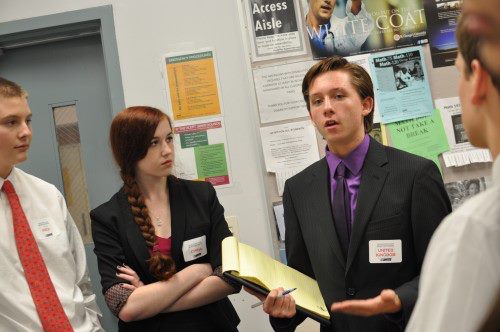
The Pre-Committee confusion can seem overwhelming at first, but navigating it correctly can put you even closer to winning the gavel.
We’ve all been there: that hot, stuffy hallway in which delegates are milling about awkwardly, waiting for committee to start. It’s awkward, it’s uncomfortable, and nobody is ever sure quite what to do. But if handled correctly, it could also win you the gavel. The importance of first impressions in professional relationships is not a new concept, but they can actually be quite difficult to master. In order to do so, we need to start with how we form first impressions.
As much as we try not to judge a book by its cover, we actually do so quite frequently. The subconscious mind uses very subtle cues to form an impression of somebody within the first few seconds of meeting them. You may not even be aware of what your mind is doing, but once you’ve made impression, it is unlikely to change throughout the course of a committee. This means that, if you handle this stage of committee correctly, you can actually set yourself up to lead committee without even making a speech. In my experience, there are three characteristics that that make you flag you as powerful and memorable to others: Positioning, attitude, and conversation.
1. Positioning: One of the first things people will notice about you is the way you are positioned. Are you milling about aimlessly? Are you standing off in a corner? Are you stationary or are you moving? Generally, people who see you taking a stance of power, without being too aggressive, will perceive you as a leader. The best place to start this is at the basics. There are a few things that can make a world of difference in the way other people perceive you, but even the most experienced delegates often overlook or overdo them. Stand with a straight back and shoulders, but don’t take it to the point where you’re too rigid. You want to look like a comfortable business person, not a soldier. As for where you are in the room, I’ve found that the best way to approach this is to stand with a few other experienced delegates and let other delegates come to you. Striking up a conversation and sticking to it makes you a person of interest to other delegates who are looking for conversation, and allowing other delegates to gravitate toward your circle leaves a strong impression.
2. Attitude: This is possibly one of the most important ones. Putting yourself in a powerful position will get other delegates to come to you, but how do you get them to stay? The goal is to make yourself powerful but approachable, the social hub of the committee. Here’s how:
- The handshake: If you’ve ever watched carefully when a great and popular politician shakes hands with people, you’ll notice how approachable and amicable they appear. This is because even though they are the more powerful party, they give off the sense of humility, as if they are truly honored to meet this person. To emulate this, start by simply leaning into the person whose hand you are shaking. If you’ve ever watched Bill Clinton shake a hand, you’ll see that he always slightly hunches his shoulders and leans forward, almost in a half-bow. Not only does this break up the stiff-shouldered power stance that is great for looking powerful but not terribly approachable, but it makes the person feel as if they are important to you. The second thing Bill Clinton does is making use of his left hand. He accompanies his handshakes with a touch on the shoulder or wrist, a small but personal gesture that seems to give the handshake more meaning. Experiment with what gestures feel more natural to you, but try to make the handshake something more than a stiff formality.
- The introduction: This may seem like socializing 101, but a little listening can go a long way. For each person you meet, give them their own personal time in the limelight and ask them questions about them as a person, not a nation. You want to get to know them; make it seem as if each person is the most interesting one you’ve met that evening. This will build you a loyal base of friends within the committee who will comment on your speeches and seek you out in caucuses.

In and out of committee, taking on a strong stance with good posture and making yourself the center of a social group can make you a memorable leader to other delegates.
3. Conversation: Many delegates tend to jump right into their speeches with the first delegates they meet. While discussing the committee is never a bad idea, I’ve found that keeping conversation light and enjoyable tends to make other delegates more drawn to you. Talk about where you’re from, the types of things you enjoy outside of MUN, or share some funny moments from other committees. Remember: a still block of people caucusing before committee might draw some serious delegates in, but nobody wants to pass over a group of people laughing and making friends without joining in. And with you at the center, people are going to recognize you as a leader.
The final tip I have for you is simply to be confident, no matter what you do before or during committee. Simply facing the committee seemingly without fear can make you one of the most memorable people in the room. For those of you who, like me, tend to get pre-committee jitters, I’d recommend checking out this article on nervousness just remember: everybody is starting out with equal footing. No matter where you are, other delegates are just as nervous and nerdy as you are, and everybody is just looking for a friend to make them feel comfortable. So reach out to people. Not only will people respect you for making them less uncomfortable, but, as I’ve learned, you might just gain a few lasting friends. Just remember: a little confidence can take you a long way.


